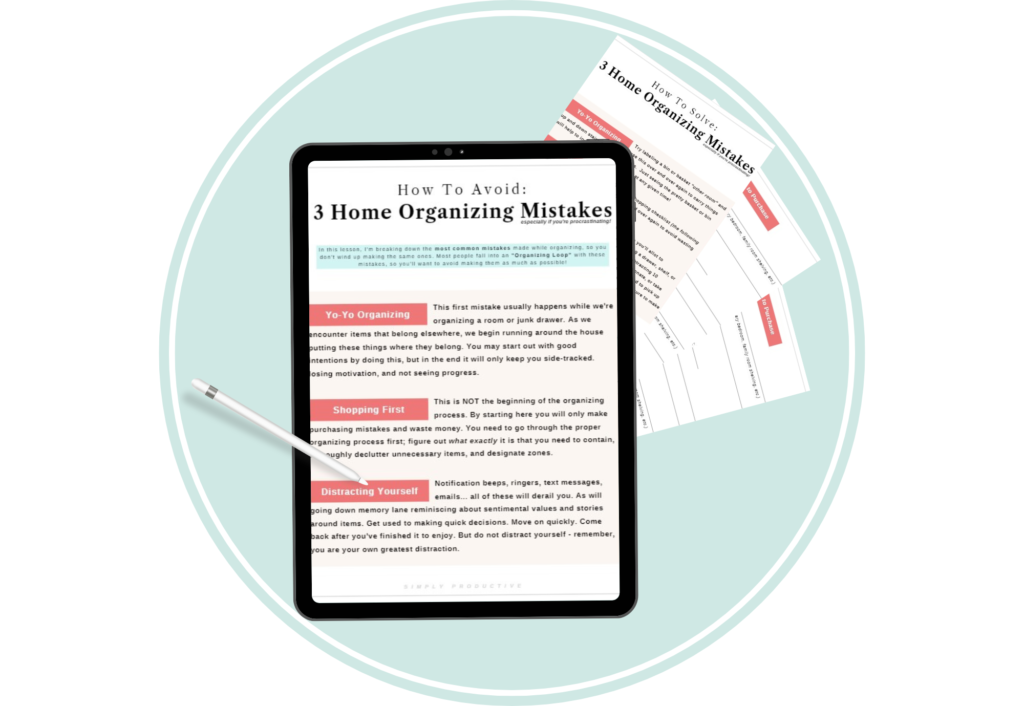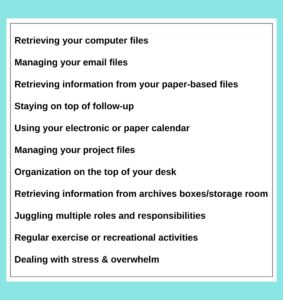

The Meaning of Clutter Control
When a space is filled with too much stuff and has no form of clutter control in place, it can make you distracted and unfocused.
Drilling down to the real reason the piles are there is crucial to uncovering why you do what you do. Because once you get familiar with the real reason of WHY you keep feeding these habits, you’ll find there is room for growth, change, and implementing new methods of clutter control.
Then this is where the magic happens!
Organizing and “clutter control” can sound like pretty big commitments, but once you break down what it really means to control your clutter, you will see they really aren’t that scary after all!

FREE DOWNLOAD
Learn How To Avoid Making These 3 Mistakes,
+ How To Solve Making Them – FOREVER!
Steps in the right direction can be as simple as spending a little extra time creating a folder for a new project, jotting down a date and setting a reminder for it in your digital calendar, or just using a velcro dot on a pen so it sticks in a place where you need it every time. It’s really that simple!
Use these few key questions to get to the root of where your piles are coming from. Read below and take some time to answer honestly!
Clutter Control Q’s:
- What do distractions cost you on a daily basis:
– In time?
– In lost revenue?
– In relationships?
– For your health? - What is the physicality of keeping extra stuff costing you financially?
- What don’t you have time for that you wish you could again?
- Do you wish you could control and minimize your clutter easily?
- What is in the way of you living out your true passion?
Take a few moments right now to add up the costs of your extra stuff. Remember to factor in all insurance costs, storage costs, cleaning costs, space allocation costs, and costs of containing your stuff.
Then there’s the time you spend maintaining your stuff.
Take a moment to access all of what your extra stuff and lack of clutter control is costing you and write that down on a piece of paper or in your computer.
“My stuff is costing me [$ this much] in wasted time, storage costs, maintenance…”
Lack of Clutter Control + Health of Your Immune System
Having too much stuff can also affect the health of your immune system, and anyone else who lives in your household or spends time in your cluttered workspace.
This is because when your piles of clutter or paper sit stagnant for too long, they become magnets for collecting dust, grime, and air pollutants.
And if they aren’t put away or cleaned regularly the whole room can quickly become a breeding ground for dust and bacteria… say hello to chronic sickness!
And what’s worse? These harmful types of inside environments can heavily aggravate existing allergy symptoms.
Don’t have any allergies? 👇🏼
Well, by spending a large portion of your time in a cluttered environment you are increasing your risk of developing asthma by a whopping 40%.
Is that a risk you’re willing to take?
So with all this in mind, what’s the next action step you’ll take towards making your office or room more inspiring?
Are you going to paint the walls? Recycle all your piles of paper and magazines that you rarely refer to? Buy a shredder? Hang up some inspiring artwork?
Whatever it may be, you already know you’ll need to make some changes in order to get rid of the dust piles and have an inspiring workspace again.
Go ahead and write down the first action step you’ll take.

Clear the Clutter from Your Calendar
If you didn’t know already, clutter control isn’t just about your physical stuff!
Think about all the commitments you’ve made by saying yes when you really wanted to say no. Do you have a tendency to try and please everyone by saying yes a lot?
You’ll need to learn how to set boundaries around your time if this sounds like you. The first thing you’ll need to do is get very clear on your own personal values and what’s of the most importance to you.
Make sure you schedule that important stuff first; relationships, time for yourself, exercising, getting enough sleep, and so on.
Then fill in the rest of your life!
What Should I Declutter Next?
These questions haven’t been easy so far, but they are important to consider nonetheless!
Now we’re at the perfect time to reflect where you are in this moment and assess what’s working, what’s not working, and what you’d like to be different moving forward.
The next action step that you take now could be the step that leads you to a whole new level of productivity and peace of mind. How exciting!
Having great clutter control and finally being organized in your office, home, and life is a beautiful thing!
If your stuff has side-tracked you, all there is to do is get back on track.
So, take your time in answering these important questions and then schedule your action steps and make it happen!
When we leave this place (and we all eventually will), you won’t be taking your stuff with you. All your precious things will remain exactly where you left them.
So do yourself and those you love a favor and get rid of all the unimportant stuff!
And remember to always enjoy the process – there is hope, life, and light at the end of the organizing tunnel!
What has been the most significant part of your clutter control journey? Comment below!




